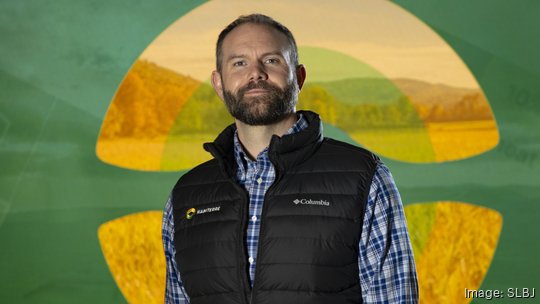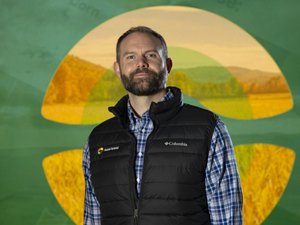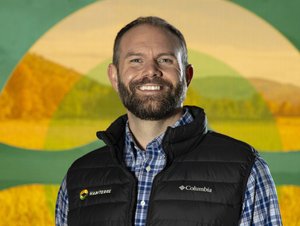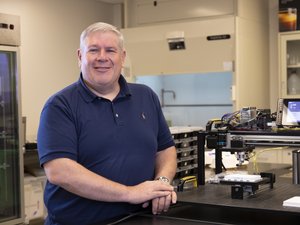
HabiTerre, a St. Louis-linked startup that does environmental and productivity data for the agricultural industry, has raised more than $10 million of Series A funding, led by investor John Deere.
HabiTerre is based in Champaign, Illinois, but led by CEO Nick Reinke, who is based in St. Louis, where the company is planning to open an office. In a news release, HabiTerre said the investment will help scale its technology that measures farmers' environmental impacts like greenhouse gas emissions and soil carbon outcomes. The data can help farmers understand how different techniques impact productivity and the environment, and is applicable to grasslands, forests and wetlands, too.
Terms of the funding round were not disclosed, including whether John Deere is taking an equity position in the company, and how much. HabiTerre in August filed a regulatory disclosure indicating it had sold nearly $10.15 million in equity shares out of a total offering of up to $14.15 million.
Reinke, the CEO, said in an interview Thursday that HabiTerre is seeking to raise another $3 million to $4 million more in Series A funding, which will build on expanded growth.
"There are lots of opportunities within our core crops and geographies: major commodity crops like corn, soy and wheat in the U.S. Midwest. But there's a huge demand for expanded crops and expanded geographies. You can go global in places like Latin America," he said. "That additional funding will support innovation functions for the business, where building out a core product the initial investment and building out the innovation function to apply our product to a broader set of geographies and crops."
The new funding round will allow the company to scale and accelerate work to expand the use of its data products to help farmers. Per its website, HabiTerre can provide information on farmland performance, including weekly productivity and yield forecasting as well as insights into nutrient management, carbon sequestration, water conditions and hyperspectral imaging, which processes information from across the electromagnetic spectrum to detect objects or materials. Clients need year-over-year data for sustainability and progress reports, so HabiTerre operates on a software-as-a-service basis.
Reinke said companies trying to decarbonize their agricultural sourcing footprints are HabiTerre's main customers. Scaling will mean serving more farmers, more acres and, ultimately, large-scale food and beverage and consumer packaged goods companies.
"We're seeing really strong demand for better data to support their emissions reporting and progress towards their climate targets," Reinke said. "We've had really good proof-of-concept with a number of major commercial customers and are scaling up to serve more of them on more acres."
The company last year launched a collaboration with Arkansas-based Tyson Foods and its Local Grain Services Sustain program, which promotes cover crops, reduced tillage, nutrient management and other practices around its corn supply.
Reinke said HabiTerre can model the processes that result in emissions over varying farm practices from field to field and region to region. Fertilizer manufacturing creates significant emissions, but so can things like tillage to prepare soil and control weeds or equipment running on internal-combustion engines.
"What's the actual environmental outcome of a certain set of practices?" Reinke said. "Our customers are either engaging directly with farmers, providing financial incentives for them to improve production practices and then rewarding them for those improvements, or they're just trying to get their arms around better sustainability- and emissions-sourcing data for existing farm production systems."
"You've got to look at the full life cycle of emissions, and then it becomes kind of a materiality question," he said. "Our focus is on what we call 'cradle-to-farm gate' emissions: input sourcing like fertilizer all the way through the production practices on the farm. That can include things like fuel usage, but the biggest opportunities for change tend to be around farming practices like tillage, cover-cropping and fertilizer-management.
"When you think about it, you can only minimize fuel usage so much: You still have to run the machine over the field regardless. You can get a little bit of the benefit from fuel emissions by having fewer passes over the field: if you remove a tillage pass, that removes the fuel use and the soil disturbance. But the most material impacts tend to be in how you manage the soil and how you manage fertilizer."
The Series A financing comaes in addition to funding awarded last month from the Missouri Technology Corp. It was one of seven startups chosen by public-private partnerships to share $2.6 million to boost entrepreneurship in the state.
“This is an exciting new launching point for HabiTerre”, said Dr. Kaiyu Guan, founder of HabiTerre and an environmental scientist at the University of Illinois at Urbana-Champaign, said in a news release. The company was formed from Guan's research at the university. “We have the ambition to become a global standard to quantify agricultural decarbonization and sustainability metrics. We are building upon an already strong history, but there is much more work yet to be done, and HabiTerre is excited to dig in and be the industry leader.”










